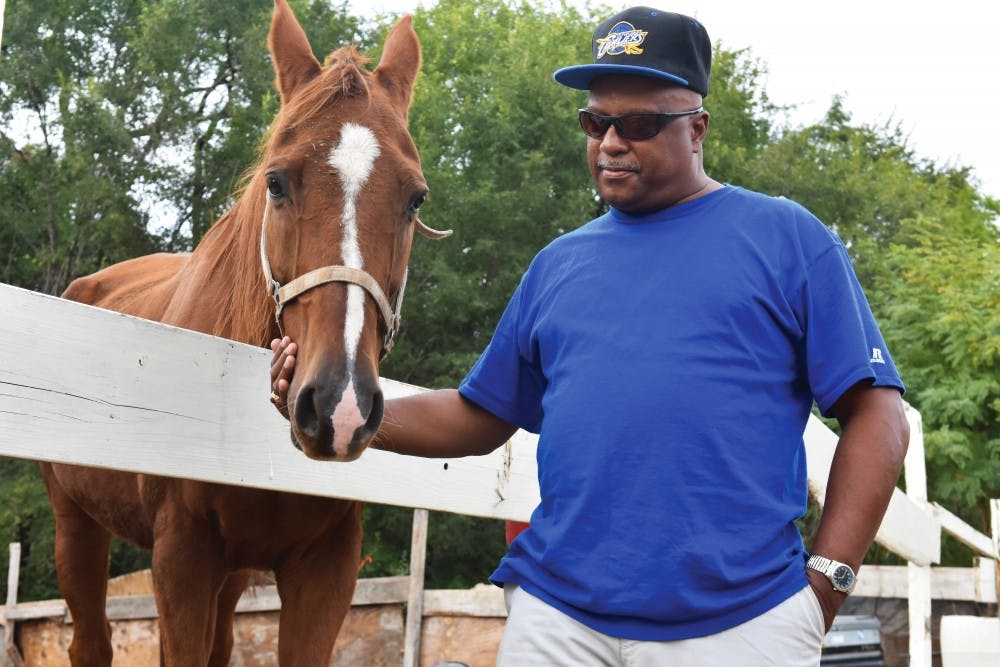Malik Divers is no stranger to horsing around.
Divers, a Southwest Philadelphia native and the subject of the viral video “The Concrete Cowboys of Philadelphia,” heads an urban stable near the west bank of the Schuylkill River. And while his work is playful and competitive, his main motivation, he says, is to better the lives of community members in and around his stable.
For the past 15 years, Divers, 57, has been part of a unique Philadelphia tradition of inner-city horsemanship. Divers’ stable, which contains three horses, teaches equestrian skills to kids from around Philadelphia. After the rent rose on the empty lot he used as his last stable on 56th and Paschall streets, Bartram’s Garden reached out to provide space for his horses and support the stable’s vision.
While Divers teaches local children at no cost, other stables charge for lessons. Chamounix, a large stable in Fairmount Park, has a work-to-ride program for disadvantaged urban youth that fields a championship polo team. One of Divers’ stablehands, 21-year old Chris Coger, left the Chamounix program to work with Divers.
“When he got of age, his mother had to pay. She couldn’t pay, so he found this urban stable and ever since has been with me,” Divers said.
Divers’ goal is to provide an outlet for at-risk youth to focus on riding.
“You can’t have one foot in the street and the other with the horses. Gotta put all your mind into this,” he said.
His efforts to improve the welfare of the city around him thus far have come face-to-face with the realities of neglected and impoverished urban communities. Many of his students come from significantly disadvantaged backgrounds, and he provides them with a stipend and structured activity in exchange for their caring for the horses and selling horse rides.
“Ten years old, they wake up with nothing to eat, no dinner ... One of them used to make money and feed his family off those horses. They take care of [the horses] and they take care of them. One hand washes the other,” Divers said.
Divers’ stable makes some money by selling horse rides to locals, Coger said, adding that he has given rides to people as young as toddlers and once to a 68 year old.
Many amateur cowboys find the stable to be a source of stability. For Eli Mount, 22, who started to ride three years ago and recently returned to the stable, working with the horses provided him with a strong source of support.
“I just came back working with Mr. Malik again because I’ve had ups and downs with my family ... I treat Malik like he’s my dad and he treats me like his son,” he said.
Divers has witnessed the effects of crime on his community and stable-family. One of his students was murdered in what seemed to be a random act of violence, he said.
“He was one of my good kids. It was a senseless killing. He was a good rider, loved to clean the stable, liked to ride,” Divers said. “And somebody just took his life.”
The dynamics of his work with the community are complex. One student worked with Divers for six years as his father finished a prison sentence, he said. Divers taught him exhaustively about the horses and made him the stable manager. After returning from prison, his father pulled him from the program, Divers said.
“A lot of kids’ fathers and mothers, some of them was appreciative and a lot of them [weren’t] in one way or another. I guess they was glad their kid was coming home with money,” he said. “None of them ever walked up to me and shook my hand and said thanks for what you did.”
Another of his participants was paid a couple dollars a day selling water bottles on a street corner before he came to the stable, Divers said. When Divers saw a hole in Jabriel’s sneakers, he took him to get new shoes and clothes.
“He didn’t have to worry no more,” he said.
“He was making money with the horses, taking care of his family.”









